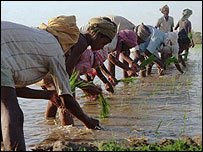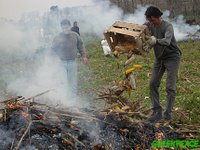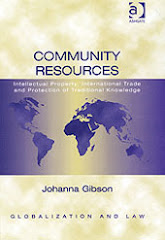 Over the past few months there has been extensive press, including here at Patenting Lives (click here for all stories on GM rice), on the controversial GM contamination of US rice imports to Europe, first announced in August.
Over the past few months there has been extensive press, including here at Patenting Lives (click here for all stories on GM rice), on the controversial GM contamination of US rice imports to Europe, first announced in August.In September the UK Food Standards Agency (FSA) published a statement declaring there to be no health risk associated with the contamination. Now the FSA is preparing to face a legal challenge over its response to the contamination Friends of the Earth UK (FOE) has filed in the High Court an application for judicial review. In a press release last week, FOE stated that the FSA "failed to take necessary action to prevent UK consumers being exposed to illegal GM rice in their food." Back in September, the BBC reported that FOE first wrote to the FSA in an attempt to avoid legal action. In that same report, the FSA response was, "We haven't told retailers not to test, but haven't required them to test."

The application follows the decision of the Standing Committee on the Food Chain and Animal Health (SCFCAH) to back the Commission Decision on strict counter testing of all US rice imports. Speaking in a report by Andrew Bounds, in the Financial Times, Philip Tod, spokesperson for Markos Kyprianou (EU Commissioner for Health and Consumer Protection and pictured at right), said, "We can only be responsible for our own testing and controls ... It is incumbent on other countries to enforce theirs."
The US and Europe have yet to agree on a common testing regime. Floyd Gaibler, US Deputy Undersecretary for Farm and Foreign Agricultural Services, has been reported in Farm Futures as stating that the burden of mandatory testing will effectively end its rice trade with Europe: "it would just have the effect of not allowing trade to resume." European environment ministers are calling for international rules to improve the detection of contamination. This has been supported by EuropaBio, the European association for bioindustries. Simon Barber of EuropaBio told the FT, "Because we have a global trading system there is always the possiblity that minute trace levels of GMOs will turn up where they do not have legal approval. This is going to happen again and again." According to the Andrew Bounds, US GM proprietors "appear to have lost control of their technology."
Such "lost control" has prompted Greenpeace to demand immediate suspension of all US imports, asking for Bayer to be "held accountable for its negligence" by banning the company from conducting further trials. Greenpeace described Bayer as "clearly incapable of controlling contamination of rice with its genetically engineered varieties," after the discovery of a second illegal strain from Bayer in as many months. Meanwhile, US farmers are suing Bayer because of the commercial threat of contamination, closing markets and driving away consumers.
But a report in Thailand's The Nation describes the "burden" for the US as a "windfall" for Thai farmers. The report notes that the Thai government has remained committed
 to its non-GM policy. Open field trials were banned in 2001, but papaya farmers have had the ban lifted. But in light of the "windfall," Greenpeace has petitioned the Administrative Court to end open-field trials, as reported in the Bangkok Post. Greenpeace also filed a petition against the Department of Agriculture and its Director, Adisak Sreesunpagit, for negligence in preventing a leak of GM papaya seeds during a controlled field trial by Khon Kaen Horticultural Research Station in 2004. According to Patwajee Srisuwan of Greenpeace, contamination continues despite the Department's decision to elminate all GM papaya at Khon Kaen. Earlier this week, the Bangkok Post Business reported that Thai authorities have re-assured importers that Thai rice is GM-free.
to its non-GM policy. Open field trials were banned in 2001, but papaya farmers have had the ban lifted. But in light of the "windfall," Greenpeace has petitioned the Administrative Court to end open-field trials, as reported in the Bangkok Post. Greenpeace also filed a petition against the Department of Agriculture and its Director, Adisak Sreesunpagit, for negligence in preventing a leak of GM papaya seeds during a controlled field trial by Khon Kaen Horticultural Research Station in 2004. According to Patwajee Srisuwan of Greenpeace, contamination continues despite the Department's decision to elminate all GM papaya at Khon Kaen. Earlier this week, the Bangkok Post Business reported that Thai authorities have re-assured importers that Thai rice is GM-free.The EU mandatory testing has also led India's top rice exporters and farmers
 unions to warn against further field trials for GM rice. A report by the BBC states that farmers insist that any doubt in the GM-free status of their rice will threaten their trade. And the newspaper, The Hindu, reports that leading rice exporters are concerned that restrictions now imposed on the US could be extended to other countries, including India, if contamination is not prevented . Reuters has reported that farmers and importers are concerned that contamination during storage or transportation will undermine not only consumer confidence but also India's reputation. According to the director of Tilda Riceland, RS Seshardri, "Indian rice is GM-free and we want to keep it that way."
unions to warn against further field trials for GM rice. A report by the BBC states that farmers insist that any doubt in the GM-free status of their rice will threaten their trade. And the newspaper, The Hindu, reports that leading rice exporters are concerned that restrictions now imposed on the US could be extended to other countries, including India, if contamination is not prevented . Reuters has reported that farmers and importers are concerned that contamination during storage or transportation will undermine not only consumer confidence but also India's reputation. According to the director of Tilda Riceland, RS Seshardri, "Indian rice is GM-free and we want to keep it that way."And farmers are certainly taking action to keep it that way. The Bharatiya Kisan Union (BKU), a farmers union in India, recently destroyed a GM rice trial in Haryana. According to a report in the India Express, around 400 farmers, many from the Rampura village in the Karnal district of Haryana, met at the site of the trial, calling for its destruction for fear of GM contamination. The group then torched the trial in what the Indian Express described as a "serious setback" for GM field trials.
One of the protestors, Paramjit Singh, was in fact the farmer on whose land Mahyco-Monsanto was conducting the trial. A report in the Business Standard says that Mr Singh had not been informed that the trial was a GM trial. But nevertheless, the burning was described as "unwarranted" by the Department of Biotechnology (DBT) Review Committee on Genetic Manipulation (RCGM). Member Secretary of the RCGM, Dr TV Ramanaiah, appeared to dismiss the obligation to inform was apparently dismissed by Member Secretary, saying to the Business Standard, "Mahyco which grew the crop for contained field trial had our approval. So it was a legal activity. As for informing farmers, how do you expect every farmer to be told about the various experiments that are being done." How indeed. The Business Standard report states "Activists of BKU pointed out that neither the farmer nor the panchayat president were told of the trials, as is required under the regulations." The farmer had leased the land for contract farming at Rs 15 000.
Meanwhile, Mahyco has come under other "fire" recently, after the publication of the findings of an investigation by the Centre for Sustainable Agriculture (CSA) into Bt Okra trials in the Gulbarga district of Karnataka. The report notes also that the DBT Guidelines are not always being followed, leading to similar problems with information. The state government of Karnataka was unable to respond adequately to applications for information, admitting that it had no information on where GM trials were being undertaken in the region.
The Supreme Court of India banned new field trials of GM crops earlier this year, following a public interest petition filed in May 2005. The petition claimed inadequate biosafety protocols, including allowing field childs to commence prior to biosafety testing, were a serious threat to both public health and the environment. The Supreme Court ban is to allow for an examination of these approval mechanisms.
And recently, Iran's Department of Environment (DoE) has decided against issuing an official approval to commence cultivation of GM rice. According to reports, the DoE did not receive sufficient documentation to be convinced that the benefits outweighed the potential risks.
Back in Europe, resistance to GM among consumers remains high. A recent AFP report says that very little GM food ends up on the plates of European consumers. And the preferences of EU citizens have relevant and significant effects on the markets for EU member states, particularly those for organic products. Efforts to achieve meaningful co-existence measures for traditional, organic, and GM crops, are repeatedly undermined by contaminations.
The UK Department for Environment, Food and Rural Affairs (DEFRA) has recently received strong criticism for its coexistence proposals. According to a report in Farmers Weekly, a joint response by FOE, the Soil Association, and GM Freeze, to the government's coexistence consultation claimed that some of the proposals breached European law. In an FoE press release, Pete Riley, Director of GM Freeze, and Peter Melchett, Policy Director of the Soil Association, both condemn the proposals as removing the rights of consumers and farmers to choose. Clare Oxborrow, of FoE, said that "The proposals are a thinly veiled attempt to introduce GM crops through the back door." She said further, "Allowing routine, unlabelled, GM contamination of conventional and organic crops is not only unacceptable to the public, it is legally flawed too." The consultation closed Friday, 20 October.
Elsewhere in Europe, contamination continues to undermine arguments that coexistenc
 e can been meaningfully achieved. Planet Ark recently reported that organic farmers in Spain have been forced to abandon maize crops after detecting traces of GM strains. And farmers in Greece are taking action against Syngenta, Pioneer, and the Greek Government for GM maize contamination in 2004. The General Confederation of Greek Agrarian Association (GESASE).
e can been meaningfully achieved. Planet Ark recently reported that organic farmers in Spain have been forced to abandon maize crops after detecting traces of GM strains. And farmers in Greece are taking action against Syngenta, Pioneer, and the Greek Government for GM maize contamination in 2004. The General Confederation of Greek Agrarian Association (GESASE).Meanwhile, GM crops threaten to defeat Romania's ability to meet the deadline for banning GM "Roundup Ready" soybean crops. The deadline, an effort to meet EU environmental rules, is set at 1 January 2007, the same day Romania is to join the EU. Unlike many citizens in the EU, however, Romanians are reported as being less concerned about the regulation of GM. The Balkan Insight reports that "A poor level of compliance reflects the lack of interest in the subject felt by Romanian consumers." Whether this also reflects levels of awareness, information, or engagement in the debate is unclear.
And the push towards bilateral negotiations adds to these concerns. A report, Bila
 teral Biosafety Bullies, by GRAIN and the African Centre for Biosafety identifies a relationship between bilateral trade channels and an associated weakening in biotech regulations, in favour of opening markets for GM crops. This kind of regionalism threatens to undermine genuine multilateral negotiation. "The push to regulate - or rather, prevent the regulation of - GM food through bilateral instruments is not happening in isolation. It is part of a much larger trend in international relations."
teral Biosafety Bullies, by GRAIN and the African Centre for Biosafety identifies a relationship between bilateral trade channels and an associated weakening in biotech regulations, in favour of opening markets for GM crops. This kind of regionalism threatens to undermine genuine multilateral negotiation. "The push to regulate - or rather, prevent the regulation of - GM food through bilateral instruments is not happening in isolation. It is part of a much larger trend in international relations."But European consumers will continue to work to buck the trend.



2 comments:
CSA fact finding team exposure in Gulbarga was on Bt okra crop not bt brinjal. this needs correction
Ramanjaneyulu
executive director
CSA
gvramanjaneyulu@gmail.com
visit http://www.indiagminfo.org for further information
Thanks Ramanjaneyulu, this has now been corrected. And thank you also for visiting the site. All the best.
Post a Comment